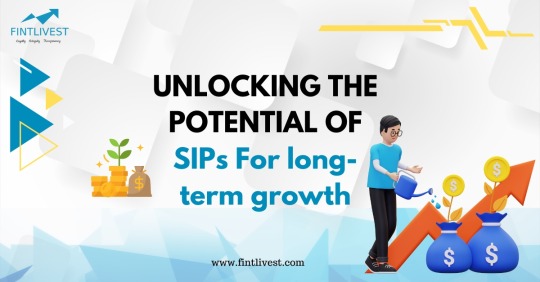#SIPBenefits
Text
Unlocking the Potential of Systematic Investment Plans (SIPs) for Long-Term Growth

In the realm of investment strategies, consistency is often the key to unlocking long-term financial success. One such strategy that embodies this principle is Systematic Investment Plans (SIPs). SIPs have gained popularity among investors for their ability to harness the power of consistent investing, providing a pathway to wealth accumulation and financial security over time. In this article, we delve into the essence of SIPs and explore how they offer a potent tool for achieving your financial goals.
Understanding Systematic Investment Plans (SIPs)
At its core, a Systematic Investment Plan (SIP) is a disciplined approach to investing in mutual funds. Unlike lump-sum investments, where a large amount is invested at once, SIPs involve investing a fixed amount at regular intervals, typically monthly or quarterly. This systematic approach eliminates the need for market timing, as investors contribute regardless of market fluctuations.
The Power of Consistency:
Consistency is the cornerstone of SIPs and is what sets them apart from other investment strategies. By committing to invest a fixed sum regularly, investors benefit from the power of compounding. Compounding is the snowball effect where the returns generated on investments are reinvested to generate further returns. Over time, this compounding effect can significantly boost the growth of your investment portfolio.
Mitigating Market Volatility:
One of the primary advantages of SIPs is their ability to mitigate the impact of market volatility. Since investments are spread out over time, SIP investors benefit from rupee-cost averaging. In essence, this means that when markets are down, your fixed investment amount buys more units of the mutual fund, and when markets are up, it buys fewer units. Over the long term, this helps smooth out the impact of market fluctuations and reduces the risk associated with timing the market.
Achieving Financial Goals:
SIPs are highly versatile and can be tailored to meet a wide range of financial goals. Whether you're saving for retirement, education expenses, a down payment on a house, or any other long-term objective, SIPs provide a structured approach to achieving your goals. By consistently investing over time, investors can accumulate the wealth needed to fulfill their aspirations.
Flexibility and Convenience:
Another attractive feature of SIPs is their flexibility and convenience. Investors can start with a relatively small investment amount and gradually increase it over time as their financial situation improves. Additionally, most mutual fund companies offer the convenience of automating SIP payments, allowing investors to set up a standing instruction with their bank for hassle-free investing.
Conclusion:
In today's dynamic and uncertain financial landscape, a disciplined and consistent approach to investing is more crucial than ever. Systematic Investment Plans (SIPs) offer investors a powerful tool to navigate market volatility, harness the benefits of compounding, and achieve their long-term financial goals. By committing to regular investments and staying the course, investors can unlock the full potential of SIPs and pave the way for a brighter financial future. In essence, while SIPs offer a powerful tool for consistent investing and long-term growth, the guidance of financial advisors or experts serves as a catalyst for achieving financial freedom and security. Together, with the right blend of discipline, patience, and expert guidance, investors can embark on a journey towards realizing their financial aspirations and unlocking a future of prosperity and freedom.
Empower your financial journey with a FREE consultation today. Your future starts now. 💯
🔗 To know more, visit - www.fintlivest.com
📞 Contact us – 8951741819 / 9637778041
👉 Follow for daily financial tips and strategies: @fintlivest
#InvestingForTheFuture #FinancialFreedom #SIPInvesting #LongTermGrowth #WealthBuilding #FinancialPlanning #SmartInvesting #WealthManagement #InvestmentStrategies #SIPforSuccess #SecureYourFuture #InvestmentGoals #SIPBenefits #SteadyReturns #FinancialWellness #InvestmentOpportunity
Get FREE financial advice from our experts to plan your investment with Fintlivest!
To know more, visit - www.fintlivest.com
Contact us – 8951741819 / 9637778041
https://www.instagram.com/fintlivest
https://www.facebook.com/Fintlivest
https://www.youtube.com/@Fintlivest
https://in.pinterest.com/fintlivestservices/
#investment#insurance#personalfinance#finance#wealthmanagement#InvestingForTheFuture#FinancialFreedom#SIPInvesting#LongTermGrowth#wealthbuilding#FinancialPlanning#SmartInvesting#financialwellness#SIPBenefits
0 notes
Text

SIP, or Systematic Investment Plan, is an investment technique that permits people to invest a fixed amount routinely in a mutual fund of their decision. This fixed investment can be made on a month to month, quarterly, or yearly premise, furnishing investors with a restrained and organized way to deal with abundance creation.
Know More: https://shorturl.at/enuxB
0 notes
Link
A systematic investment plan is a process of investing by making regular equal investments in a mutual fund, fixed deposit, or stocks. Systematic investment plans (SIPs) are more popular with mutual funds. The frequency of equal investments in a SIP can either be weekly, monthly, or quarterly.
#sip#whatissipinvestment#sipinvestment#systematicinvestmentplan#sipcalculator#sipbenefits#stockquantum
0 notes
Text
Top 10 financial mistakes to avoid in your 20’s and 30’s

Navigating your 20s and 30s can be a financial minefield. Many individuals in these age groups face significant life changes and decisions that can impact their long-term financial health. Here are the top 10 financial mistakes to avoid during these critical decades:
1. Not Budgeting: Failing to create and stick to a budget is one of the most common financial mistakes. Without a budget, it’s easy to overspend and lose track of where your money goes. A budget helps you manage your income, control your expenses, and plan for savings and investments.
2. Accumulating High-Interest Debt: Credit card debt and other high-interest loans can quickly become unmanageable. Avoid carrying a balance on your credit cards and prioritize paying off any high-interest debt as soon as possible to prevent it from scrolling out of control.
3. Neglecting Emergency Savings: Life is unpredictable, and not having an emergency fund can lead to financial disaster. Aim to save three to six months' worth of living expenses in an easily accessible account to cover unexpected costs like medical emergencies or car repairs.
4. Living Beyond Your Means: It’s tempting to keep up with peers who might be earning more or spending lavishly. However, living beyond your means can lead to significant financial stress and debt. Focus on living within your income and avoiding unnecessary expenses.
5. Not Investing Early: The earlier you start investing, the more you can benefit from compound interest. Delaying investments can cost you significantly in potential growth. Start with small, consistent investments in retirement accounts like a 401(k) or IRA.
6. Ignoring Retirement Savings: Retirement might seem far away, but it’s crucial to start saving early. Take advantage of employer-sponsored retirement plans, especially if your employer offers matching contributions. Even small contributions can grow significantly over time.
7. Not Having Insurance: Skipping essential insurance, such as health, renters, or auto insurance, can lead to massive out-of-pocket expenses if something goes wrong. Ensure you have adequate coverage to protect yourself from unforeseen financial burdens.
8. Overlooking Financial Education: Many people neglect to educate themselves about personal finance. Understanding basic financial principles can help you make informed decisions about budgeting, saving, investing, and managing debt. Consider taking courses or reading books on personal finance.
9. Impulsive Spending: Impulse buying can derail your financial goals. Whether it’s shopping for clothes, gadgets, or dining out frequently, it’s essential to be mindful of your spending habits and avoid unnecessary purchases.
10. Not Planning for Big Expense: Failing to plan for significant expenses such as buying a house, starting a family, or furthering your education can lead to financial strain. Create a savings plan for these big-ticket items to avoid taking on excessive debt.
Conclusion
Your 20s and 30s are crucial decades for building a solid financial foundation. By avoiding these common financial mistakes and making smart money decisions, you can set yourself up for long-term financial success and stability. Remember, the key is to start early, stay informed, and be proactive about managing your finances.
For more detailed financial advice and tips, consider visiting reputable financial education websites such as Fintlivest or seeking guidance from a financial advisor.
Invest in your peace of mind. Schedule your FREE financial consultation today! 💯
🔗 To know more, visit - www.fintlivest.com
📞 Contact us – 8951741819 / 9637778041
👉 Follow for daily financial tips and strategies: @fintlivest
#InvestingForTheFuture #FinancialFreedom #SIPInvesting #LongTermGrowth #WealthBuilding #FinancialPlanning #SmartInvesting #WealthManagement #InvestmentStrategies #SIPforSuccess #SecureYourFuture #InvestmentGoals #SIPBenefits #SteadyReturns #FinancialWellness #InvestmentOpportunity
Get FREE financial advice from our experts to plan your investment with Fintlivest!
To know more, visit - www.fintlivest.com
Contact us – 8951741819 / 9637778041
https://www.instagram.com/fintlivest
https://www.facebook.com/Fintlivest
https://www.youtube.com/@Fintlivest
https://in.pinterest.com/fintlivestservices/
#investment#insurance#budgeting#personalfinance#wealthmanagement#financialplanning#investmentstrategy#smartinvesting#money#financialfreedom
0 notes